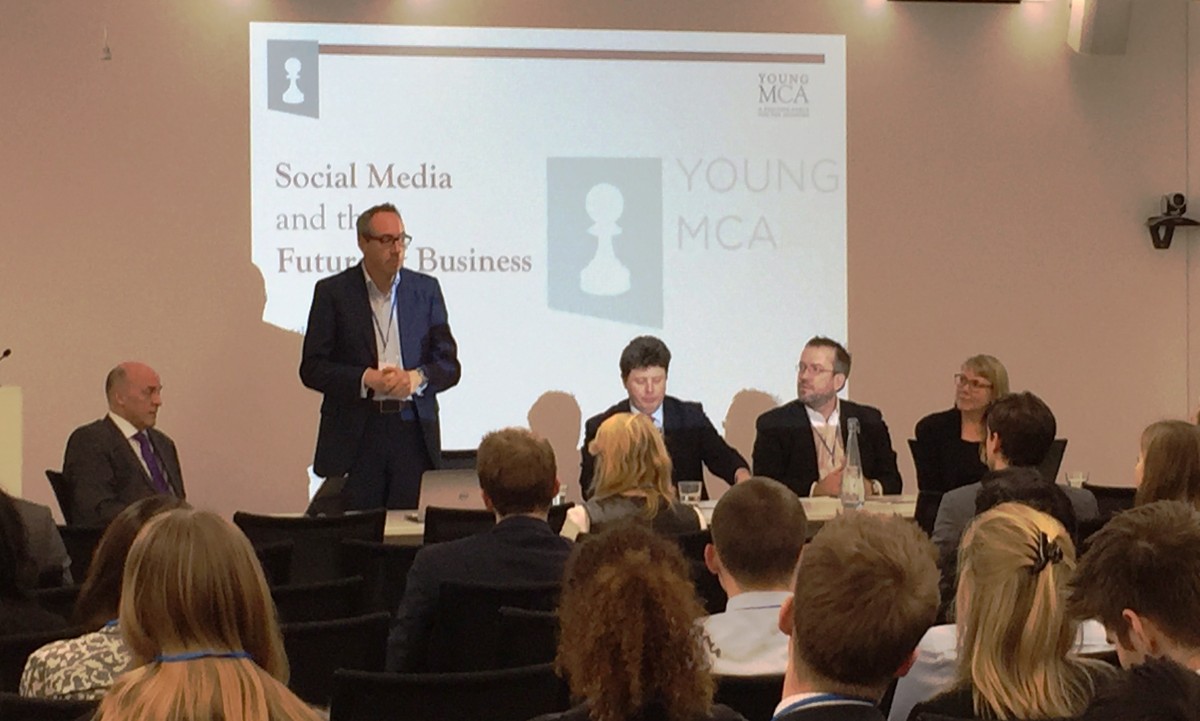As part of the MCA’s year of Digital, the Young MCA hosted a panel debate on ‘Social Media and the Future of Business’. The panellists for the session, which was chaired by MCA Think Tank Director Paul Connolly, were Glyn Knaresborough (CSC), David Woodhead (CSC), Peter Neufeld (EY) and Kat Mandelstein (PwC).
The technology behind social media is not complex. So creating a social media campaign relies upon having someone in a firm that has an ability to act differently. MCA member firms are successfully engaging with social media in innovative ways. CSC’s Valentine’s Day ‘I Love’ Campaign, for example, confirms that consultancy firms have the capacity to do something different. The ‘I love’ campaign attracted customers to a brand at zero cost and generated 200,000 website hits in one week.
This example highlights how social media is an effective medium of communication between organisations and customers. We are increasingly seeing new ways that brands and customers can engage with each other. Social media is facilitating the exchange of knowledge between two parties. There is an exchange deal that exists between the customer and the user. For example, Google give you free storage, email and search engine- and in exchange the user gives them access to track their behaviour.
Social media has opened new pockets of power, for both brands and customers. For brands, social media is powerful as it gives them an insight into customers’ issues in real-time. As a result, they can adapt their mode of delivery to meet customers’ needs. Those organisations and brands that are weaving social media into their existing offerings are ahead of the curve. These include Barclays who have added Twitter to their instant mobile payment app PingIT.
As for consultants, social media is powerful for both understanding their clients’ customers but also from their employees’ perspective. Internally, when organisations are effectively using social media it can create a collaborative community in which employees’ voices are valued and recognised within their organisation. ‘Digital Natives’ are given more responsibility. This helps reshape the business. We are seeing a wider mixture of skills and ages being combined in consulting teams, transforming business approaches. PwC terms this the creation of ‘Digital Tribes’.
It is evident that MCA member firms are leveraging the power of social media. Yet firms must not become complacent, but ensure they remain ahead of the game.
Firms have an opportunity to connect more with their customers through social media channels. Customers’ sphere of influence and power is heightened by social media. They have the opportunity to do extraordinary things to brands, both positive and negative: become loyal supporters, collaborators, critical voices, hostile forces, destroyers of reputations. And businesses will simply have to respond. Social media is fast and continuous 24 hours a day, not a traditional customer service centre open for complaints Monday to Friday, 9 to 5.

A poll taken during the evening of the Young MCA evening demonstrated that firms must continue to engage with employees through social media. To examine how MCA member firms engage with their employees via social media, the audience were asked:
- Do your firms use snapchat? There were no hands.
- How many of you follow you firms on Twitter? Many responses
- How many of you retweet something your firm has tweeted? An improved response, few hands.
- How many of your firms follow you on Twitter? Very few responses
The responses indicated that there is always scope for improvement. In particular, it showed that firms could do more to marshal their workforces’ energy on social media to support their own strategies. Indeed, firms must respond to the pace of social media interaction in order to drive engagement, be it with customers, clients or employees.
Before platforms and networks there were people and things. There are still people and things, but platforms and networks have become crucial to how things are consumed and how people interact. For firms, irrespective of sector or size, they have no choice not opt into these platforms and networks, such a social media. There are always ways that firms of all sizes across sectors can look at ways of engaging with their customers and employees to continue staying ahead of the curve. Customers and users of social media will talk about your brand irrespective of whether, as a firm, you have social media presence. Where firms do have a choice is that they need not exist on every channel and push content out continuously. Rather, firms need to know what channels their customer base are on and engage with them this way.
Social media is always on. Customers can always engage and brands. Our clients – and we as consulting firms – need to respond to this in order to stay ahead of the game.
Written by Annabelle Thomson, Analyst at KPMG for the Young MCA Update, as part of the MCA Year of Digital.



